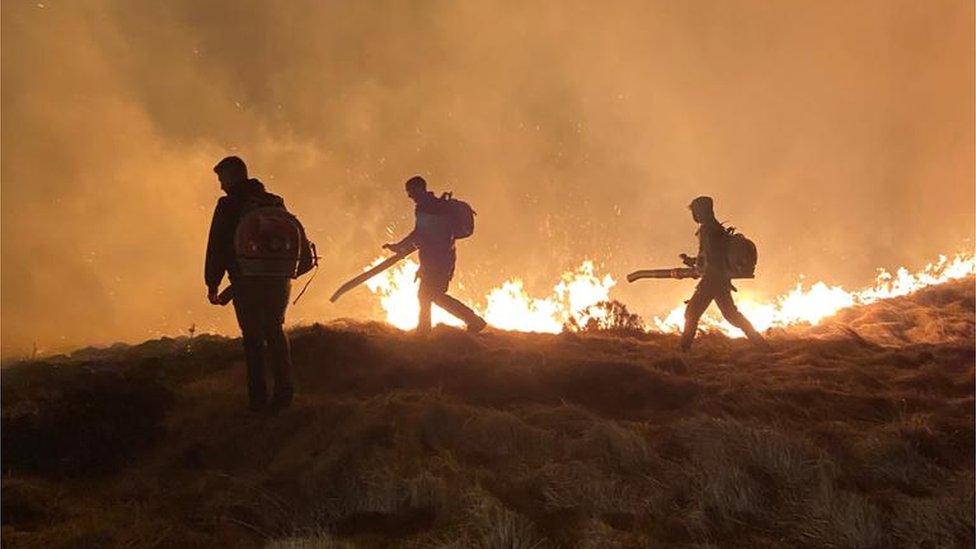Why have wildfires been breaking out recently?
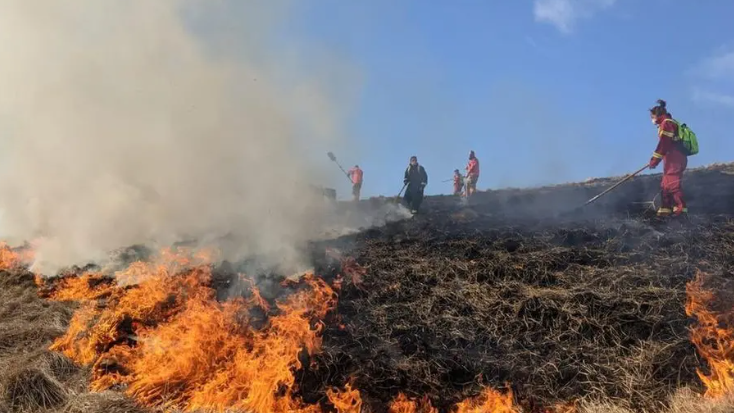
Firefighters said tackling recent blazes had been "arduous"
- Published
Firefighters have said they have been badly stretched trying to tackle a spate of large wildfires which have ignited, burning large areas of countryside across the East Midlands.
Derbyshire Fire and Rescue Service said it had been called to deal with 17 fires in open spaces in the last month - many of them in the Peak District moorlands.
Colleagues in Nottinghamshire and Leicestershire have also battled blazes in the open.
Swathes of land and natural habitats have been lost to flames, emergency services have said.
What's caused the recent fires?
Group manager David Diggins, Derbyshire Fire and Rescue Service's head of prevention, said: "What we've seen over these last four weeks is a real sharp increase."
A mixture of human actions and natural conditions had made parts of the county prone to wildfires lately, he added.
He said warmer weather, as winter gives way to spring, had dried out areas of countryside making it more likely fires could spark and then spread.
He urged people enjoying the good weather in the outdoors to be careful.
"Flicking of cigarettes and the lighting of barbecues can really, really easily spread into large wildfires and that can cause devastation to communities, the local environment and cause havoc with emergency services," he said.
"Alongside those, we can see those fires that people do start in their homes, in their gardens, very easily spread out of control as well.
"It isn't just those wide open spaces, fires in gardens during periods of dry and warm weather can quickly spread."
Mr Diggins said campers using barbecues and campfires also posed a risk and that he was concerned given the Easter holidays were approaching.
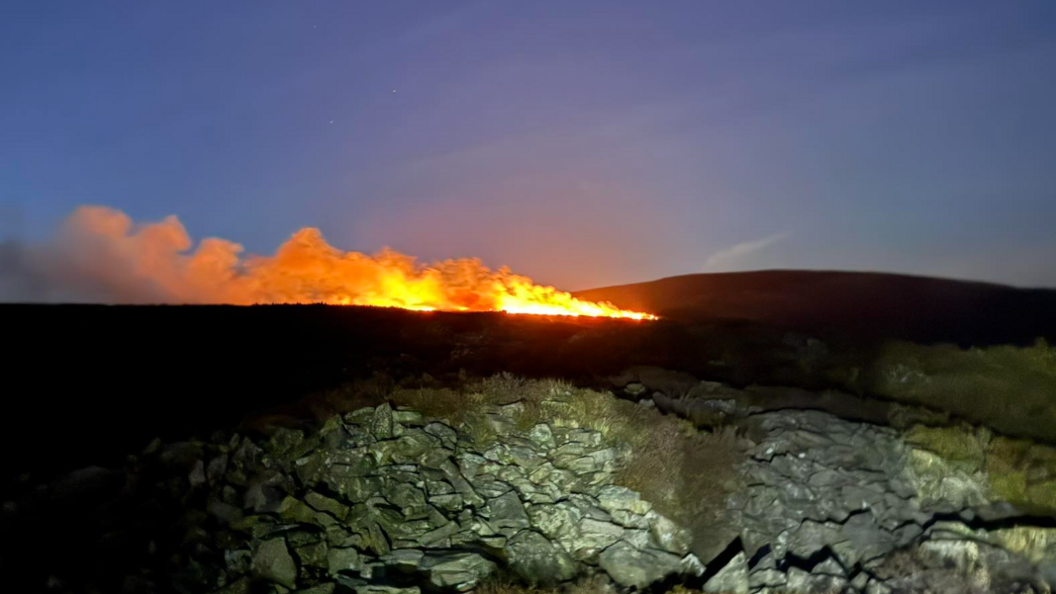
Firefighters said blazes like this, near Glossop, caused huge amounts of damage to moorlands
"Wildlife can be devastated for years and years to come by wildfires," Mr Diggins said.
"Large amounts of smoke are being produced that can travel at low levels over community areas and impact them in that way as well."
He said fires in woodland were also particularly difficult to contain because the trees and terrain hindered fire crews trying to get to fires to extinguish them.
"These incidents are very arduous for us. They take a lot of time locating and a lot of travel time to get the firefighters across terrain to tackle them," he added.
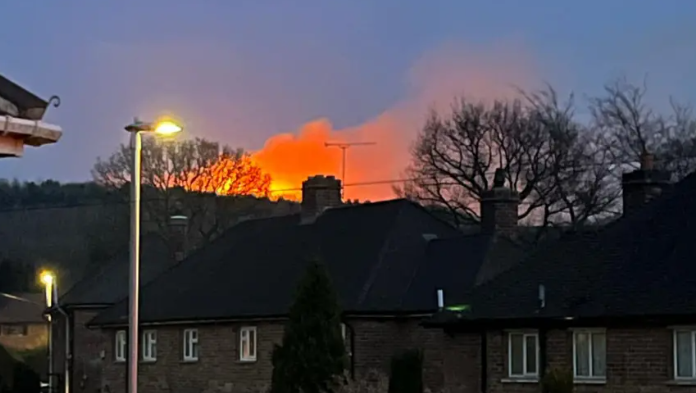
A fire broke out on high ground at Bardon Hill in Leicestershire on Tuesday
Mr Diggins said contingency plans were in place to deal with wildfires but added: "They do drain our resources and divert us away from other incident types like house fires and road traffic collisions.
"We do have resilience measures in place to make sure that we can always attend incidents but it will put a drain on the local emergency services."
Mr Diggins said he wanted people to be able to enjoy the Derbyshire countryside but he urged people to be vigilant to fires and quickly report them.

Analysis
By Anna Church, BBC senior weather presenter
The East Midlands had one of its sunniest Marches on record alongside being very dry, and these conditions have continued into April, with temperatures this week four or five degrees Celsius above the usual average for the time of year.
Spring in the UK is often transitional, with shifts between colder and warmer spells, but this year we're seeing an early taste of summer-like warmth.
Not much is expected to change as high pressure will continue to dominate our weather as we go into next week, keeping us settled and warm. There are also no signs of any significant rain for at least another week.
These dry and warm conditions, coupled with the moderate to strong winds we've been experiencing, provide the ideal conditions for wildfires to spread. The winds will be easing slightly at the beginning of next week, which should help to reduce the risk.
In contrast, it is worth noting that this time last year, we were in the middle of one of our wettest springs on record.

A spokesperson for the Peak District National Park Authority said: "The moorlands of the Peak District National Park are of global environmental importance, dominated by large expanses of blanket bog and upland heath.
"We must protect these moorlands from the considerable risk of damage by wildfires which are sadly a common occurrence throughout the year."
The park authority said the majority of fires were caused unintentionally and carelessly, often by unextinguished and poorly managed barbecues, discarded cigarettes, and litter, including glass which can cause intense heat.
Barbecues are banned in the open countryside anywhere in the Peak District, the authority added.
Get in touch
Tell us which stories we should cover in Derby
Follow BBC Derby on Facebook, external, on X, external, or on Instagram, external. Send your story ideas to eastmidsnews@bbc.co.uk, external or via WhatsApp, external on 0808 100 2210.
Related topics
- Published3 April
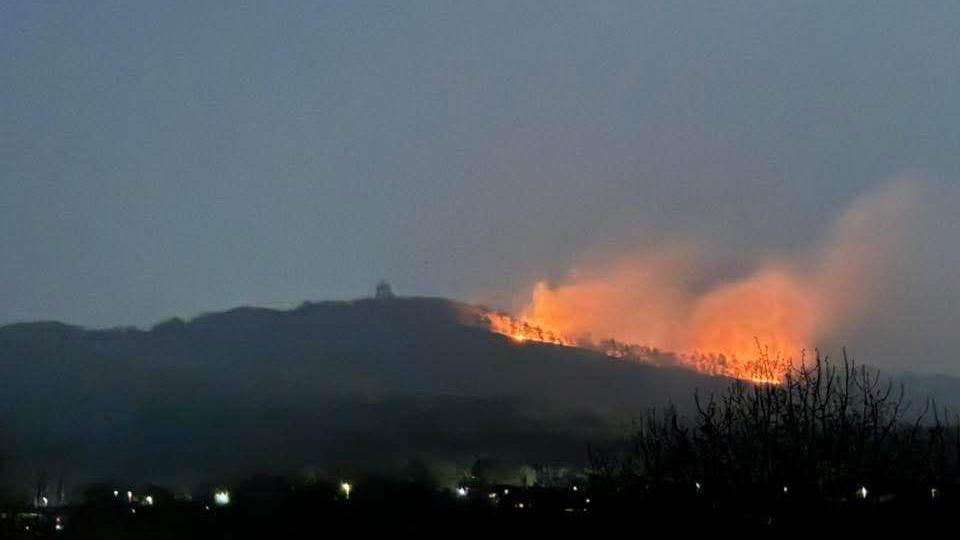
- Published17 May 2022
